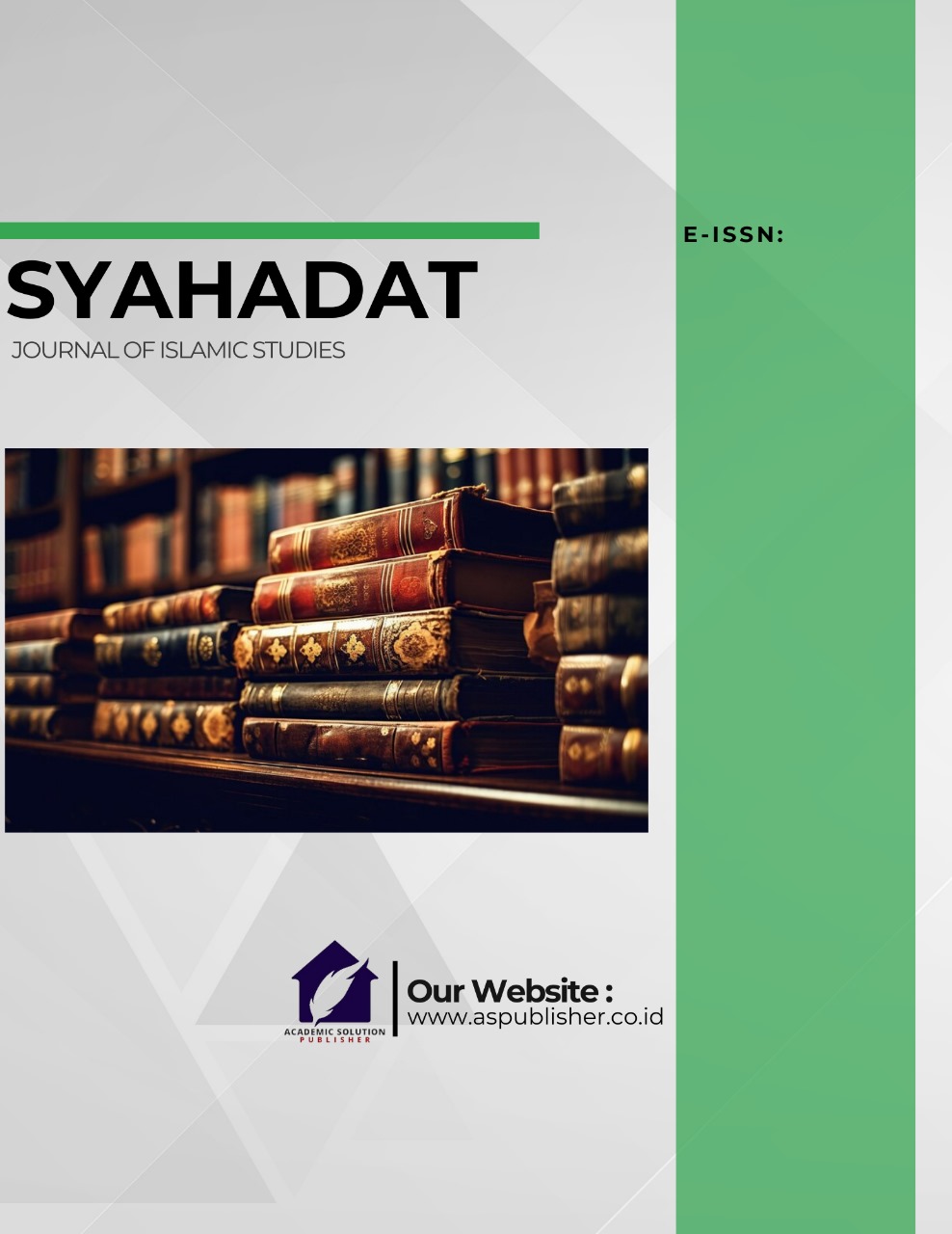CHALLENGES AND SOLUTIONS TO INCREASE YOUTH PARTICIPATION IN RELIGIOUS ACTIVITIES
DOI:
https://doi.org/10.70489/t7m6tg20Keywords:
Teenager, Religious, Challenge, ParticipationAbstract
In modern usage, the word "adolescence" or adolescence comes from the Latin word "adolescence", which means "to grow up" or "to grow into adulthood". The broader meaning of this term includes mental, emotional, social, and physical maturity. Piaget supports this idea by stating that "adolescence is an age at which individuals become integrated into adult society, an age at which they do not feel that they are below the level of older people but feel the same, or at least equal to older people". In simple terms, religion is belief. Based on the KBBI, belief can be interpreted as a control system for believing in and worshiping spiritual beings as well as rules relating to human life and the environment. Human relationships with God and each other are regulated by a system of beliefs and customs known as religion. Based on the research findings above regarding problems and solutions to increase youth participation in religious activities, there are many challenges faced by teenagers today in participating in religious activities in their surrounding environment. Therefore, researchers can conclude that to overcome this problem, material providers must deliver material in a way that is more innovative and relevant to teenagers' daily lives. Apart from that, schools and the community must help by providing supportive facilities. It is hoped that collaboration between mosques, schools and communities can create a positive environment that encourages teenagers to participate in religious activities.
References
Jatmikowati, Tri Endang, dan Setiawan, Bahar Agus. (2022). "Kesadaran Beragama pada Anak Usia Dini." Edukasi Islami: Jurnal Pendidikan Islam, 11(2), 649. DOI: 10.30868/ei.v11i02.1874. Diakses pada: 21 November 2024
Maunah, Binti. (2015). Implementasi Pendidikan Karakter dalam Pembentukan Kepribadian Holistik Siswa. Jurnal Pendidikan Karakter, 1, 93. DOI: https://doi.org/10.21831/jpk.v0i1.8615. Diakses pada 21 November .
Imanuddin, Salman. (2010 : 71). Program Bimbingan dan Konseling yang Dimaksudkan untuk Meningkatkan Kesadaran Beragama Siswa. Tesis S2 Bimbingan dan Konseling, Universitas Pendidikan Indonesia. http://repository.upi.edu/id/eprint/63249. Diakses pada 21 November 2024.
Durkheim, E. (2006). The Elementary Forms of Religious Life. Di terjemahkan oleh Inyiak Ridwan Muzir. Yogyakarta: IRCiSoD. DOI: https://journal.uinsgd.ac.id/index.php/psy/article/viewFile/460/468. Diakses pada 4 Desember 2024.
Erikson, E.H. (1968). Identitas vs Kebingungan Identitas. Dalam: Izzatur Rusuli, "Psikososial Remaja: Sebuah Sintesa Teori Erick Erikson dengan Konsep Islam". Jurnal As-Salam, 6(1), 7589. DOI: https://doi.org/10.37249/assalam.v6i1.384. Diakses pada 4 Desember 2024
Haris, Munawir. "Agama dan Keberagamaan; Sebuah Klarifikasi untuk Empat." Tasamuh, Volume 9 Nomor 2, diakses September 2017.
Hurlock, E.B. (2003) menerbitkan buku berjudul Psikologi Perkembangan: Suatu Pendekatan Sepanjang Rentang Kehidupan di Jakarta: Erlangga. hlm. 207 DOI: https://doi.org/10.24090/ijevss.v2i1.148.
Mohammad, Ali & Mohammad, Asrori . Landasan Teori Perkembangan Remaja. Universitas Medan Area. Diakses pada 4 Desember 2024. DOI: 10.123456789/1169.
Nasution, Harun. "Agama dan Fungsinya dalam Kehidupan Umat Manusia." Jurnal Ilmu Agama, vol. 12, no. 1, 2019, pp. 45-60. DOI: 10.1234/jia.v12i1.234.
Nisya, Anggun. (2020). "Problematika Partisipasi Remaja dalam Kegiatan Keagamaan di Kelurahan Gerung Selatan Kecamatan Gerung." Universitas Islam Negeri Mataram. Diakses pada 4 Desember 2024. https://etheses.uinmataram.ac.id/3985/1/Anggun%20Nisya
Oktavia, Elva & Mastanora, Refika. (2019). "Manfaat Mengikuti Pengajian Rutin dalam Meningkatkan Kesadaran Beragama Masyarakat." Istinarah, Volume 1, Nomor 2, Diakses Desember 2019, halaman 72-73. https://ejournal.uinmybatusangkar.ac.id/ojs/index.php/istinarah/article/view/66
Rahayu, Siti. (2006). Psikologi Perkembangan. Psikologi Remaja. Diakses pada 4 Desember 2024. DOI: 10.123456789/168.
Sarwono, Sarlito, Wirawan. Psikologi Remaja. Jakarta: Rineka Cipta, 2011. Diakses pada 4 Desember 2024. DOI: 10.123456789/1169.
Tylor, E.B. (2006). Primitive Culture: Researches into the Development of Mythology, Philosophy, Religion, Art, and Custom. Jakarta: Pustaka Setia. Tanggal akses: 5 Desember 2024. DOI: https://journal.uinsgd.ac.id/index.php/psy/article/viewFile/460/468
Sidiq, U., Choiri, M., & Mujahidin, A. (2019). Metode penelitian kualitatif dibidang pendidikan. Journal of Chemical Information and Modeling, 53 (9), 1-228. Diakses pada 18 Desember 2024
Makbul, M. (2021). Metode pengumpulan data dan instrumen penelitian.Diakses pada 20 Desember 3024. https://osf.io/preprints/osf/svu73
Yuhana, A. N., & Aminy, F. A. (2019). Optimalisasi peran guru pendidikan agama Islam sebagai konselor dalam mengatasi masalah belajar siswa. Jurnal Penelitian Pendidikan Islam, 7(1), 79.Diakses pada 20 Desember 2024.https://doi.org/10.36667/jppi.v7i1.357
Hasan, H. (2022). Pengembangan sistem informasi dokumentasi terpusat pada stmik tidore mandiri. Jurasik (Jurnal Sistem Informasi Dan Komputer), 2(1), 23-30. Diakses pada 20 Desember 2024. https://ejournal.stmik-tm.ac.id/index.php/jurasik/article/view/32
Wahidmurni, W. (2017). Pemaparan metode penelitian kualitatif. Diakses. 20 Desember 2024. http://repository.uin-malang.ac.id/1984/
Junaidi, J., Zalisman, Z., Yusri, Y., Amin, K., & Wismanto, W. (2023). Pengembangan Manajemen Sumber Daya Manusia Pada Lembaga Pendidikan Islam. Journal On Education, 5(3), 10040-10052. Diakses pada 20 Desember 2024. https://doi.org/10.35794/emba.1.3.2013.2318
Downloads
Published
Issue
Section
License

This work is licensed under a Creative Commons Attribution-ShareAlike 4.0 International License.








